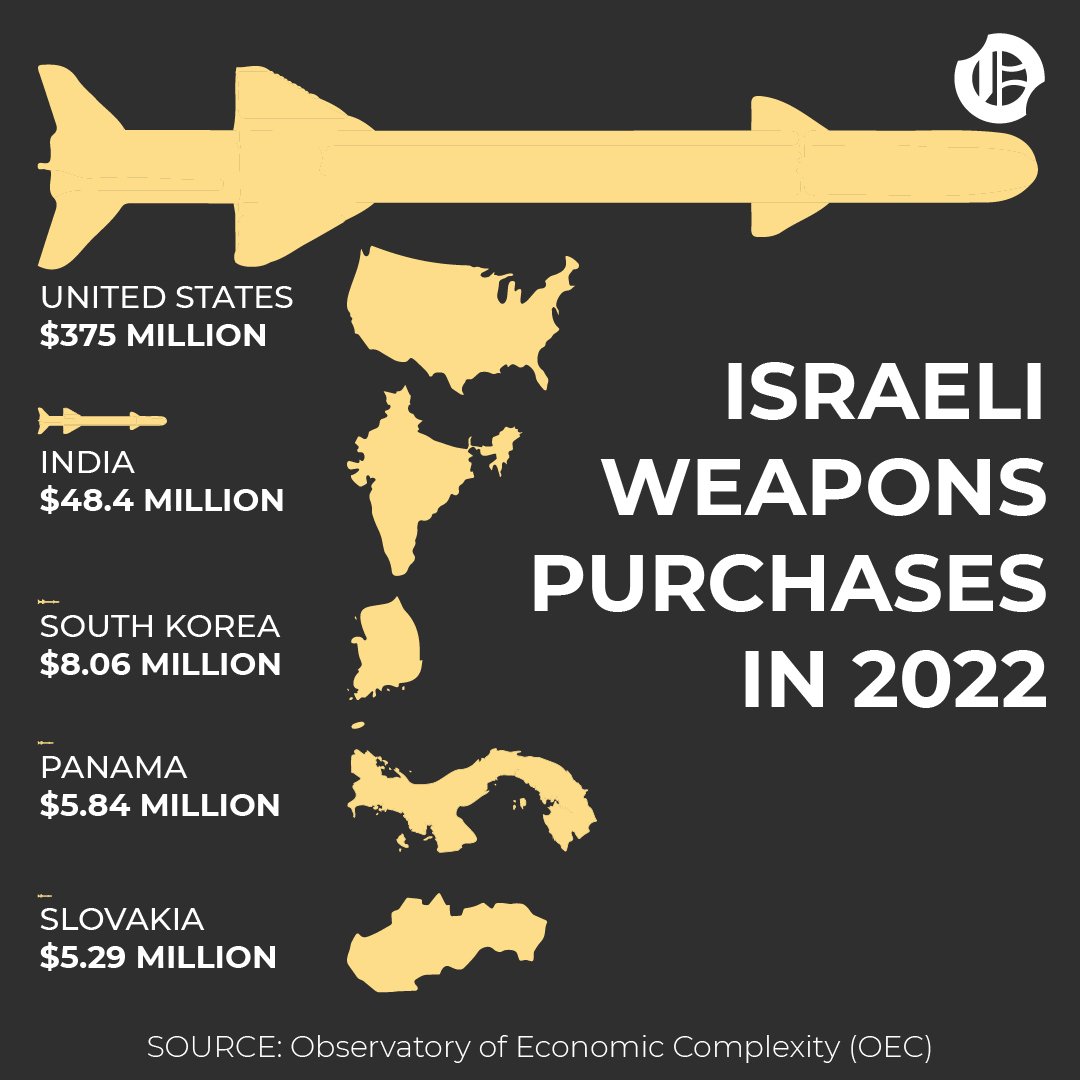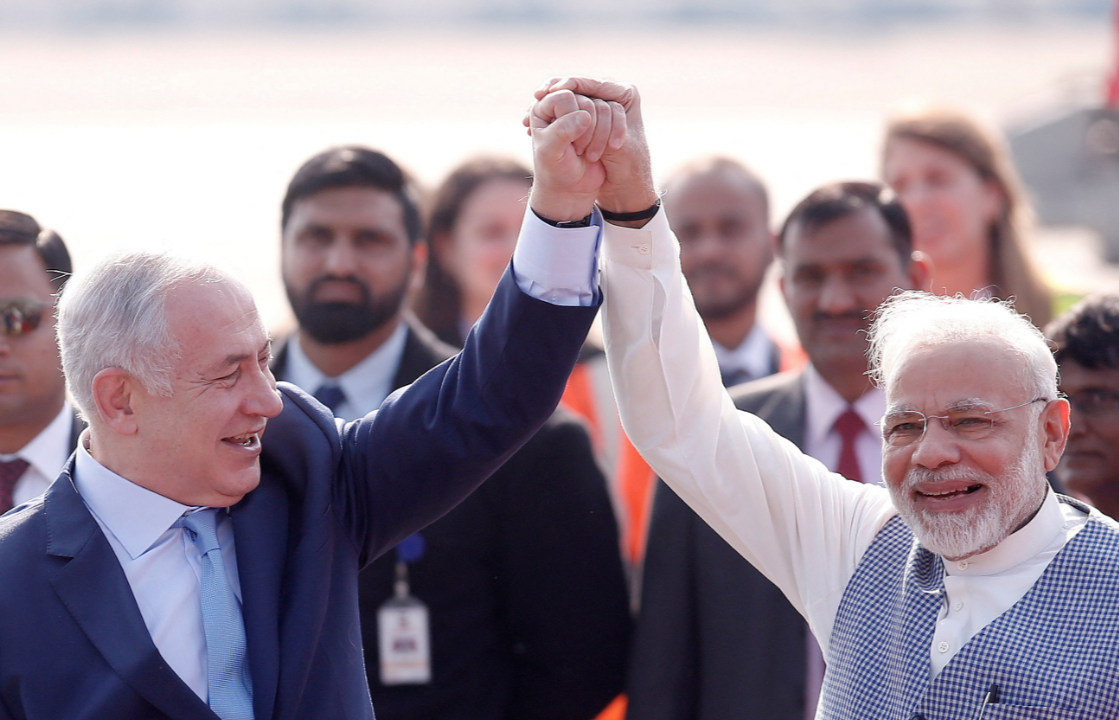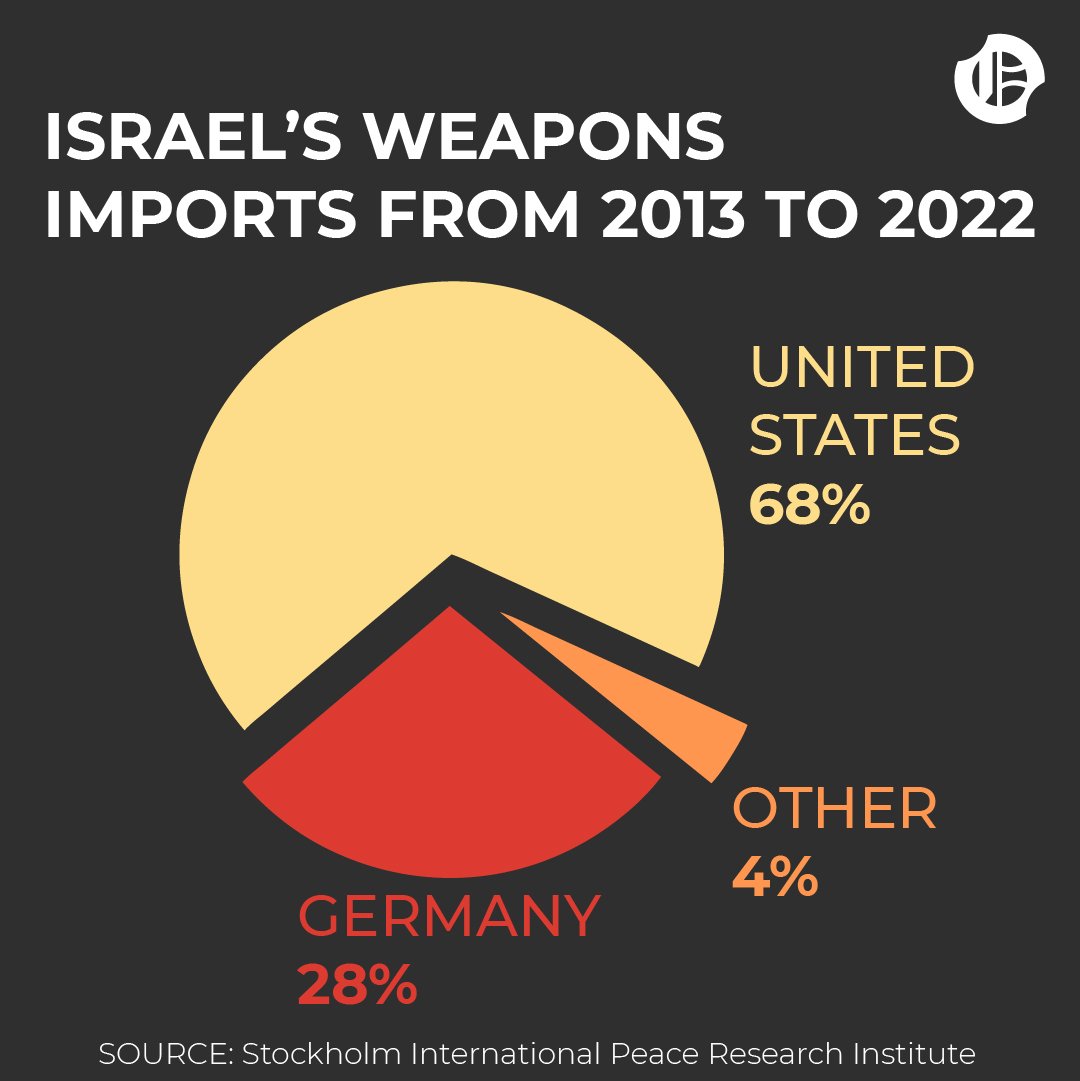
An Israeli Air Force fighter jet fires flares as it flies over the border area with south Lebanon on March 4, 2024, amid ongoing cross-border tensions as fighting continues between Israel and Hamas in Gaza. (Credit: Jalaa Marey/AFP) L'accident s'est produit dans le camp de réfugiés d'al-Chati, à l'ouest de la ville de Gaza, lors d'une opération de largage aérien d'aide humanitaire, a-t-il également dit.
A team of UN special rapporteurs and independent experts issued a warning on Feb. 24 that sending weapons to Israel could violate international humanitarian law. A week later, 218 MPs from 13 countries published an open letter outlining their commitment to enforcing bans on weapon sales to Israel.
The letter was organized by Progressive International, a network of left-wing activists and politicians, and the signatories, including eleven current or former party leaders, sit in the Parliaments of several arms exporters to Israel: the United States, the United Kingdom, Germany, Canada, France, Spain, the Netherlands, Belgium, Brazil, Australia, Turkey, Portugal, and Ireland.
In the midst of increasing concern over Israel's war in Gaza — ranging from diplomats stumbling through uncomfortable briefings to humanitarian organizations going to court against arms dealers — The Washington Post published an exclusive report revealing that the US had quietly made over 100 weapons sales to Israel since Oct. 7.
US officials told members of Congress in a classified briefing that the deliveries amounted to thousands of precision-guided munitions, small-diameter bombs, bunker busters, small arms, and other "lethal aid." The exact scale of each individual delivery was not disclosed.
![]() This handout picture released by the Israeli army on March 4, 2024, shows troops on the ground in the Gaza Strip amid ongoing battles between Irsael and Hamas. (Credit: Israeli Army/AFP)
This handout picture released by the Israeli army on March 4, 2024, shows troops on the ground in the Gaza Strip amid ongoing battles between Irsael and Hamas. (Credit: Israeli Army/AFP)
The UN special rapporteurs warned that weapon transfers "are prohibited even if the exporting state does not intend the arms to be used in violation of the law — or does not know with certainty that they would be used in such a way — as long as there is a clear risk.”
The case underway at the International Court of Justice, in which Israel stands accused of genocide in its war on Gaza, certainly qualifies as a risk. While the final verdict could take years, the ICJ’s panel of 15 judges issued a preliminary ruling and six provisional measures that signal the court believes it is plausible Israel is committing genocide in Gaza.
Israel has a robust arms industry, but its military capabilities are propped up by significant financial and military support from international allies, as is obvious from the recent torrent of weapons funneled into the country from the US.
As pressure mounts and Israel's offensive in Gaza only gets bloodier, its allies are coming under scrutiny from international human rights organizations as well as from their own politicians — not to mention sweeping pro-Palestine movements, filling streets around the world for five months now.
Questioned by journalists as he left the White House last month, US President Joe Biden admitted that he held Iran responsible for strikes by various militias on American military posts in the Middle East because "they’re supplying the weapons to the people who did it" — so, who is implicated in Israel's assault on Gaza, which has killed more than 30,000 people?
Who is sending arms to Israel?
The Observatory of Economic Complexity (OEC) data distribution platform recorded that in 2022, Israel imported $467 million in weapons, the tenth largest importer of weapons in the world. Its biggest purchases were from the US ($375M), India ($48.4M), South Korea ($8.06M), Panama ($5.84M), and Slovakia ($5.29M).
 Illustration by Jaimee Lee Haddad
Illustration by Jaimee Lee Haddad
The States: Not only is the US the biggest supplier of arms, but Israel has also been the largest cumulative recipient globally of US foreign assistance since World War II, according to a Congressional Research Service report from March 2023.
At the time of that report’s publication, the US had provided Israel with $158 billion in bilateral assistance and missile defense funding and had sold its key Middle East ally 50 F-35 Joint Strike Fighter jets, considered to be one of the most technologically advanced fighter jets ever made.
As far as is public knowledge, since Oct. 7th, the States have officially approved two foreign military sales to Israel: $106 million worth of tank ammunition and $147.5 million of components needed to make 155 mm shells.
Privately, the administration made over 100 weapon transfers to Israel without any public debate, using a loophole in which the specific dollar amount of each sale fell below the required threshold at which Congress must be notified, according to a US official that spoke to The Washington Post on condition of anonymity.
The day after the news broke, Israeli news outlet Haaretz cited publicly available flight-tracking data as evidence of at least 140 Israel-bound heavy transport planes having taken off from American military bases around the world since Oct. 7, transporting equipment mainly to the Nevatim Airbase in southern Israel.
Haaretz found that more than 70 US Air Force C-17s had landed in Israel, arriving mostly from the Dover Airbase in the US, Ramstein Airbase in Germany, and al-Udeid Airbase in Qatar — US Central Command forward headquarters. Additional deliveries were made on a number of cargo ships.
“That’s an extraordinary number of sales over the course of a pretty short amount of time, which really strongly suggests that the Israeli campaign would not be sustainable without this level of US support,” Jeremy Konyndyk, a former senior Biden administration official, told The Post.
“The US cannot maintain that, on the one hand, Israel is a sovereign state that’s making its own decisions and we’re not going to second-guess them, and, on the other hand, transfer this level of armament in such a short time and somehow act as if we are not directly involved,” he said.
Haaretz also reported that American cargo flights to Israel had been significantly higher during the first three months of the war, but that over the last two months, there's been a noticeable drop in deliveries.
![]() Israeli soldiers sit in a tank as they return from the southern Gaza strip, in southern Israel, Feb. 26, 2024. (Credit: Amir Cohen/Reuters)
Israeli soldiers sit in a tank as they return from the southern Gaza strip, in southern Israel, Feb. 26, 2024. (Credit: Amir Cohen/Reuters)
Despite what the flood of weaponry might imply, the US-Israel alliance has appeared rocky as of late, with mounting tensions around contradicting policies and positions — Israel’s looming incursion on Rafah being the latest point of contention. Two weeks ago, the US proposed a draft resolution to the UN Security Council calling for a temporary cease-fire and for Israel to go back on its plans for Rafah, and on Sunday, US Vice President Kamala Harris became the first senior US official to publicly call for a cease-fire in Gaza.
And yet the Wall Street Journal reported that the Biden administration is preparing to send roughly a thousand each of MK-82 bombs and FMU-139 bomb fuses — a delivery worth tens of millions of dollars. A US official told WSJ that the proposed weapons transfer is still being reviewed.
According to the WSJ report, Israel has used roughly half of the 21,000 precision-guided munitions officially (and publicly) sold to it by the US. The American newspaper cited a US intelligence assessment that estimates the remaining weapons are enough for Israel to sustain 19 more weeks of fighting in Gaza. That span would shrink to days if Israel launched a second front against Hezbollah.
Former head of Lebanon's General Security Abbas Ibrahim is quoted as having told Lebanese journalists in Sydney that Israel "cannot defend itself with its own forces" and must rely on supplies of American munitions.
The Washington Post's foreign affairs columnist David Ignatius wrote on Wednesday that American officials have seen no clear plan for protecting civilians in Israel's forthcoming incursion on Rafah and that the Biden administration appears to be considering ways to prevent Israel from using US weapons in what would most certainly be a devastating operation.
![]() This picture taken from a position in northern Israel shows an Israeli Air Force fighter jet flying over the border area with south Lebanon on March 4, 2024, amid ongoing cross-border tensions as fighting continues between Israel and Hamas militants in Gaza. (Credit: Jalaa Marey/AFP)
This picture taken from a position in northern Israel shows an Israeli Air Force fighter jet flying over the border area with south Lebanon on March 4, 2024, amid ongoing cross-border tensions as fighting continues between Israel and Hamas militants in Gaza. (Credit: Jalaa Marey/AFP)
Ignatius quotes two-time US ambassador to Israel Martin Indyk as saying that "the Biden administration’s level of frustration about the mishandling of the humanitarian situation in Gaza has reached the limit.”
“If Israel launches an offensive in Rafah without adequately protecting the displaced civilian population, it may precipitate an unprecedented crisis in US-Israel relations, even involving arms supplies.”
The US could argue, Igantius wrote, that in banning the use of its military support in Rafah, it was establishing an understanding similar to its one with Ukraine that long-range US missiles can’t be used to target Russian territory.
Four US officials confirmed with American news outlet Axios that the White House had recently asked the State Department and the Pentagon for a comprehensive list of all planned and proposed weapon transfers to Israel in the coming weeks.
One of those sources claimed that this is routine, but it is the first time since Oct. 7 that the White House has made this request.
India: India recognized the State of Israel in 1950, but didn't establish diplomatic relations until 1992. In the meantime, it was the first non-Arab country to recognize the Palestinian Liberation Organization (PLO) as a legitimate representative for Palestinians and recognized the Palestinian State in 1988.
 Israeli Prime Minister Benjamin Netanyahu and his Indian counterpart Narendra Modi raise their arms upon Netanyahu’s arrival at Air Force Station Palam in New Delhi, India, Jan. 14, 2018. (Credit: Adnan Abidi/File Photo/Reuters)
Israeli Prime Minister Benjamin Netanyahu and his Indian counterpart Narendra Modi raise their arms upon Netanyahu’s arrival at Air Force Station Palam in New Delhi, India, Jan. 14, 2018. (Credit: Adnan Abidi/File Photo/Reuters)
Despite needing more than four decades to normalize ties, its relationship with Israel since has flourished, and the two countries are deeply intertwined in the weapons market. India is the second largest supplier and the largest buyer of weapons from Israel — it has imported $2.9 billion worth of military hardware from Israel over the last decade.
On Feb. 21, India’s Water Transport Workers Federation (WTWF), representing fourteen thousand workers, including 3,500 stationed at eleven of India’s twelve major ports, responded to a call from Palestinian trade unions and declared they would refuse to handle weapons destined for Israel, according to a report in the Jacobin. Transport workers’ unions in Brazil, Belgium, Italy, Barcelona, US and around the world have similarly refused to handle shipments of weapons headed for Israel.
 Illustration by Jaimee Lee Haddad
Illustration by Jaimee Lee Haddad
Germany: According to the Stockholm International Peace Research Institute’s arms transfer database, 68 percent of Israel’s weapons imports from 2013 to 2022 came from the US and 28 percent came from Germany.
On Nov. 8, 2023, AFP reported that Germany had approved 10 times more in military gear exports to Israel in 2023 than it had the previous year. Data up until Nov. 2, 2023 showed that Germany had approved €303 million ($324 million) worth of military equipment sales to Israel, compared to €32 million from the year previous.
Suspended exports
As of the beginning of March, five countries have suspended weapons exports to Israel.
In early February, a Dutch court ordered the government of Netherlands to block all exports of F-35 fighter jet parts to Israel.
"It is undeniable that there is a clear risk the exported F-35 parts are used in serious violations of international humanitarian law," the court said, cited by Reuters, echoing alarm following the ICJ ruling and the ever-increasing reports of mass civilian casualties in Gaza.
Italy and Spain both claim to have completely halted all sales of weapons to Israel since Oct. 7, although Spanish media released a report showing that about $1 million worth of ammunition was exported to Israel in November.
Belgium suspended two licenses for the sales of gunpowder to Israel, citing the ICJ ruling, and one of Japan's largest general trading companies, Itochu Corporation, also cited the ICJ ruling when it announced it planned to have completely cut ties with Israel's leading weapons manufacturer Elbit Systems by the end of February.